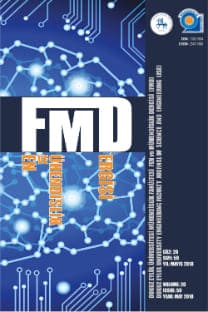GERMENCİK (AYDIN) JEOTERMAL ALANLARININ HİDROJEOKİMYASAL AÇIDAN İNCELENMESİ
Germencik, Hidrojeoloji, Hidrojeokimya, Jeotermal enerji, Jeotermometre uygulamaları, Aktivite diyagramları.
HYDROGEOCHEMICAL INVESTIGATION OF THE GERMENCİK (AYDIN) GEOTHERMAL FIELDS
Germencik, Hydrogeology, Hydrogeochemistry, Geothermal energy, Geothermometry applications, Activity diagrams.,
___
- APHA-AWWA-WPCF (1975): Standart Methods for Examination of Water and Waste Water. Fourteenth Edition, Copyright by American Public Health Assoc., Washington D.C., 1193 p.
- ARNNORSSON,S.; GUNNLAUGSSON,E.; SVAVARSSON, H. (1983): The chemistry of geothermal waters in Iceland. III. Chemical geothermometry in geothermal investigations . Geochimicia et Cosmoschimia Acta, vol. 47, pp. 567-577. Pergamon Press. USA.
- BACK, W. (1966): Hydrochemical facies and groundwater flow patterns in northern part of Atlantic Coastal Plain. U.S. Geol.Survey Proffessional paper, 498-A, 42p.
- BAŞKAN, M.E.; CANİK, B. (1983): IAH Map of mineral and thermal waters of Turkey Aegean Region. MTA No. 189, Ankara, 80 p.
- CORREIA, H.; ESCOBAR C.; GAUTHIER, C. (1990): Germencik geothermal field feasibility report, part two, October, Ankara.
- FETTER, C.W. (1994): Applied Hydrogeology Third Edition University of Wisconsin - Oshkosh. Mc Millian College Publishing Company, New York, 691 p.
- FİLİZ, Ş. (1982): Ege Bölgesindeki önemli jeotermal alanların O-18, H-2, H-3, C-13 izotoplarıyla incelenmesi. Doçentlik Tezi, E.Ü.Y.B.F., 1-95, İzmir (Yayınlanmamış).
- FORD, D.C; WILLIAMS, P.W. (1989): Karst Geomorphology and Hydrology. Unwin Hyman Ltd., London, 601 p.
- FOULLIAC, C.; MICHARD, G. (1981): Sodium/Lithium ratio in water applied to the geothermometryof geothermal waters. Geothermics, v. 10, p.55-70.
- FOURNIER, R.O. (1977a): A Review of chemical and isotopic geothermometers for geothermal systems. In : Proceedings of the Symp. on Geoth. Energy, Cento Scientific Programme, Ankara, 133-143.
- FOURNIER, R.O. (1977b): Chemical geothermometers and mixing models for geothermal systems. In: Proceedings of the Symposium on Geothermal Energy, Cento Scientific Programme, Ankara, 199-210.
- FOURNIER, R.O.; TRUESDELL, A. H. (1973): An Emprical Na-K-Ca Geothermometer for Natural Waters. Geochim. et Cosmochim. Acta, v.37 p. 1255-1275.
- FOURNIER, R.O.; POTTER, R.W. (1979): Magnesium Correction to the Na-K Ca Chemical Geothermometer. Geochim. et Cosmochim. Acta, vol. 43 pp. 1543-1550.
- GIGGENBACH, W. F.; GONFIANTINI, R.; JANGI, B.L.; TRUESDELL, A.H. (1983): Isotopic and Chemical Composition of Parbati Valley Geothermal Discharges, NW Himalaya, Indiana. Geothermics, v. 5, p. 51-62.
- GIGGENBACH, W. F. (1988): Geothermal Solute Equilibria. Derivation of Na-K-Mg-Ca Geoindicators. Geochim. et Cosmochim. Acta, 52., 2749-2765.
- HYDROWIN (1995): Computer Programme- Version 3.0, by Lukas Calmbach. Institut de Mineralogie BFSH2 1015 Lausanne. Fax: 0041/21 692 43 05. E mail: Lukas.CalmbachQ imp.unit.ch
- KASAP, İ. (1984): Geothermal resource evaluation of Germencik-Ömerbeyli (Western Anatolia) Geothermal Field of Turkey. Seminar on Utilization of Geothermal Energy for Electric Power Production and Space Heating, 14-17 May 1984, Florence, Italy.
- KHARAKA, Y.K.; SPECHT, B.J.; CAROTHERS, W.W. (1985): Low to intermediate subsurface temperatures calculated by chemical geothermometers. The American Assoc. of Petroleum Geologist, Annual Convention,Book of Abstracts, New Orleans, 24-27 March.
- KHARAKA, Y. K.; GUNTER, W. D.; AFFARWALL, P. K.; PERKINS, E. H.; DEBRAAL, J. D. (1988): Solmineq.88: A computer Program Code for Geochemical Modelling of Water-Rock Interactions. In U.S.Geological Survey Water Investigations Report 88-05.
- KHARAKA, Y. K.; MARINER, R. H. (1989): Chemical Geothermometers and their Application to formation waters from sedimentary basins. In: N. D. Näser & T. H. McCulloh (Eds.), Thermal History of Sedimentary Basins; Methods and Case Histories (pp. 99-117). Springer Verlag.
- KHAYAT, J.R. (1988): Germencik-Kızılcapınar (Aydın) ve çevresinin hidrojeolojik incelenmesi, sıcak ve soğuk suların jeokimyasal yorumlanması. Dokuz Eylül Üniversitesi Fen Bilimleri Enstitüsü Yüksek Lisans Tezi. Yöneten: Doç. Dr. Şevki Filiz,İzmir, 116 s.(yayınlanmamış).
- KRAMER, J.R. (1968): Mineral-water equilibria in silicate weathering. XXIII. Int.Geol.Cong. v.6, pp. 149-160.
- M.T.A. (1996): Germencik-Ömerbeyli-Bozköy-Çamur Jeotermal Alanı. MTA Genel Müdürlüğü, Türkiye Jeotermal Envanteri, Ankara,sayfa:68-74.
- NICHOLSON, K. (1993): Geothermal Fluids Chemistry and Exploration Techniques. Springer-Verlag Berlin Heidelberg,Germay, 263p.
- NORDSTROM, D.K.; PLUMMER, L.N.; LANGMUIR, D.; BUSENBERG, E.; MAN, H.M.; JONES, B.F.; PARKHURST, D.L. (1990): Revised Chemical Equilibrium Data for Major Water-Mineral Reactions and Their Limitations. In: D.C. Melchior & R.L. Bassett (Eds.), Chemical Modelling of Aquoeous Systems Washington :American Chemical Society.
- ŞAHİNCİ, A. (1991): Doğal Suların Jeokimyası. Reform Matbaası, Beyler-İzmir, 548 s.
- ŞİMŞEK, Ş. (1981): Aydın-Germencik alanının jeolojisi ve jeotermal enerji olanakları. EIEI yayını. Ankara.
- ŞİMŞEK, Ş. (1983): Aydın-Germencik alanı jeotermal enerji araştırmaları, Türkiye Jeoloji Kurultayı Bildirileri,Ankara, 167-168.
- ŞİMŞEK, Ş. (1984): Aydın-Germencik-Ömerbeyli Geothermal Field of Turkey. Seminar on Utilization of Geothermal Energy for Electric Power Production and Space Heating, 14-17 May 1984, Florence, Italy. Sem. Ref. No. EP/SEM.9/R.37.
- ŞİMŞEK, Ş. (1988): Büyük Menderes Grabeni Jeotermal Alanları ve Yararlanma Olanakları. Mühendislik Jeolojisi Bülteni, Erguvanlı Özel Sayısı-İstanbul, sayı 10, 39-45.
- ŞİMŞEK, Ş.; UYGUR,N.; ÖZBAYRAK, İ.H.; DİKMEOĞLU, T.; COŞKUN, B.S.; ARAS, A. (1980): Aydın-Germencik-Söke Alanının jeotermal enerji olanakları. TUBİTAK VI. Temel Bilimleri Kongresi, Kuşadası-Aydın, 251-264.
- TARDY, Y., (1971): Characterization of the principal weathering types by the geochemistry of waters from some European and African cristalline massif. Chemical Geol., vol. 7 , pp. 253-271
- UNION OIL, (1983): Union Geothermal Division, Union Oil Company of California, 2099 Range Ave. P.O.Box : 6854, Santa Roza, California.
- ISSN: 1302-9304
- Yayın Aralığı: 3
- Başlangıç: 1999
- Yayıncı: Dokuz Eylül Üniversitesi Mühendislik Fakültesi
DAL ŞEBEKELERDE EN EKONOMİK GÜZERGAHIN BULUNMASI İÇİN BİR YÖNTEM
Şebinkarahisar (Giresun) bölgesi sülfidli ve sülfatlı cevherlerinde kükürt izotopları
GERMENCİK (AYDIN) JEOTERMAL ALANLARININ HİDROJEOKİMYASAL AÇIDAN İNCELENMESİ
Şevki FİLİZ, Gültekin TARCAN, Ünsal GEMİCİ
Kemik çimentosu-kemik yapısının kırılma mekaniği açısından incelenmesi
Dal şebekelerde en ekonomik güzergahın bulunması için bir yöntem
Germencik (Aydın) jeotermal alanlarının hidrojeokimyasal açıdan incelenmesi
Şevki FİLİZ, GÜLTEKİN TARCAN, Ünsal GEMİCİ
ŞEBİNKARAHİSAR (Giresun) BÖLGESİ SÜLFİDLİ VE SÜLFATLI CEVHERLERİNDE KÜKÜRT İZOTOPLARI
ÇOK SİLİNDİRLİ BİR MOTORDA EMME VE EGZOZ SİSTEMİ GEOMETRİSİNİN PERFORMANS KARAKTERİSTİKLERİNE ETKİSİ
